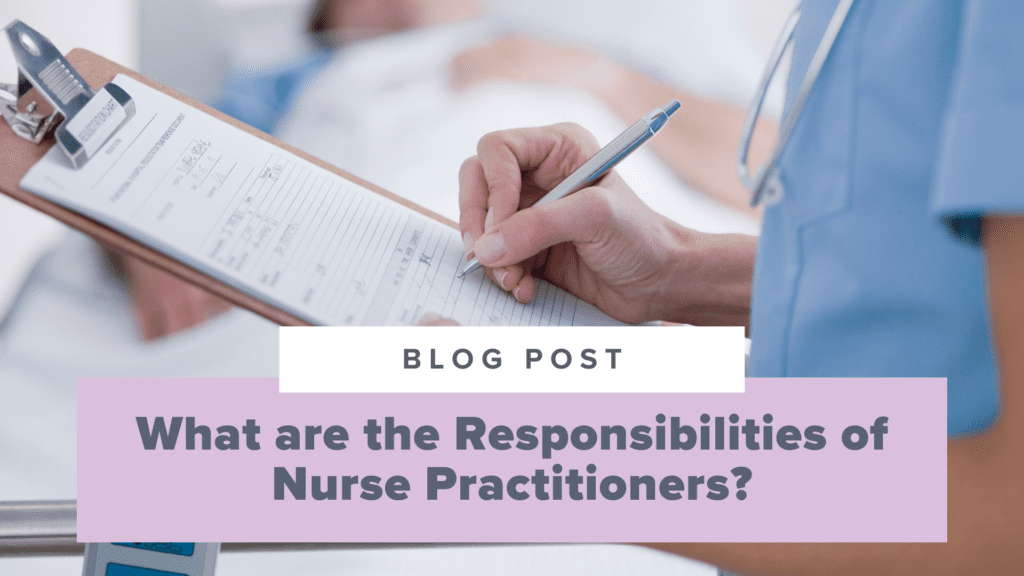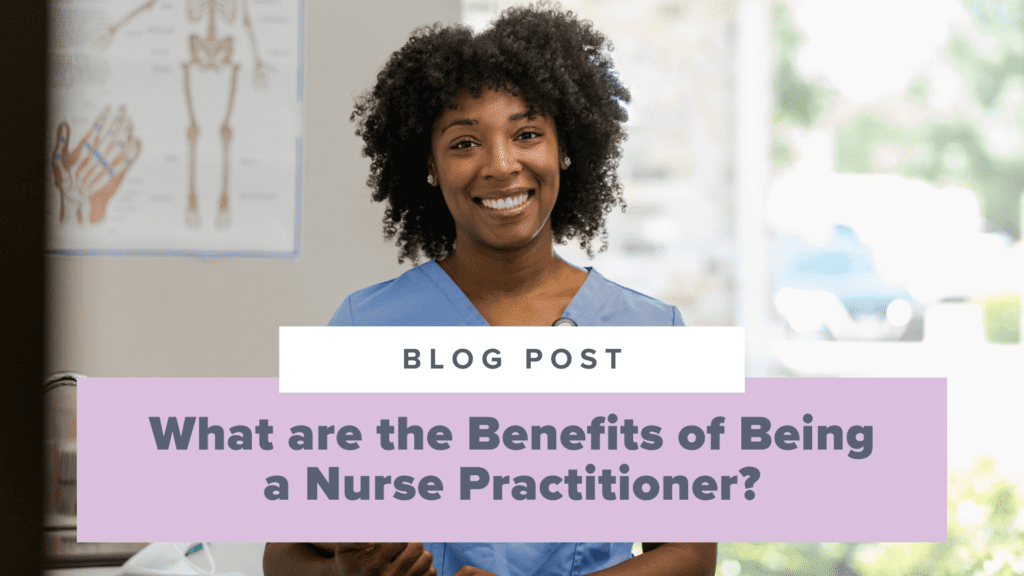Tips for Managing Test Anxiety Before Your NP Boards
- by
- Jan 24, 2024
- Articles

Welcome to our latest interview where I have the chance to talk with Sarah Michelle about one of the most common obstacles leading up to your NP exam: test anxiety. Many NP students find themselves dealing with jitters and panic as exam day approaches, which can affect your performance regardless of how much you study.
So, how do you mitigate this test anxiety leading up to your NP board exam? In this interview, Sarah shares her journey from experiencing extreme test anxiety to becoming a “test anxiety guru,” and reveals valuable strategies to combat anxiety, boost confidence, and achieve the success you deserve! Let’s dive in!
Tips for Managing Anxiety Before Your NP Boards: Interview With Sarah Michelle
Hannah:
Thanks for joining me, Sarah! Can we start with a brief intro about who you are and what you do?
Sarah Michelle:
Sure! I’m Sarah Michelle, and I created my NP review course (and my entire business!) because I had exam day anxiety that wasn’t addressed in the NP review courses I took.
I kept looking for the thing that was going to build up my confidence and bring down my anxiety, but I was literally at a point where my hair was falling out before my exam. So obviously…I wasn’t managing my anxiety very well.
After I took my exam, I realized anxiety management was what I actually needed—even more than the clinical content, because the clinical content I already had from school. I thought, maybe I could create a review that would focus more on building up confidence.
So that was the goal in the beginning. Now, I feel like I’m a test anxiety guru. I feel like I can give you all the tips, I can listen to why you failed and say okay, this is what we’re going to do next.
Common Symptoms of Test Anxiety
Hannah:
Sweet. So my next question is, what are some of the common symptoms you see students exhibiting when they have test anxiety? What are some things—either mindset wise or in the body—that you notice when someone has test anxiety?
Sarah Michelle:
I think there’s two buckets of test anxiety. There are normal exam day jitters, like ruminating about the exam, getting butterflies in your stomach, or maybe your hands get clammy. Maybe you’re a little sweaty, or maybe you’re having more trouble sleeping than usual. I think all of that is just part of taking a big exam.
And then I think there’s another bucket of exam day anxiety, which I call “panic level” anxiety. This is when you can’t sleep. Your hair’s falling out. You’re having panic attacks. You can’t breathe. That’s a whole different kind of anxiety.
A lot of what we talk about in the course are your normal exam day jitters, because most people fit into that bucket. I myself fit into the “panic level” bucket. So beyond just strategies for taking the test, I also had to work with my advanced provider and figure out what was going to be a good plan for me on exam day.
How Test Anxiety Affects Exam Performance
Hannah:
Gotcha. So when it comes to your overall exam performance, like you said earlier, even if you have the clinical knowledge, anxiety often makes it harder to demonstrate this knowledge on your exam.
As a whole, how would you say anxiety can affect exam performance, either from personal experience or what you see when you’re working with students?
Sarah Michelle:
I think a really good example is on one of my exams, I opened up the first question and it was a zebra question. And we talk about those in the courses, this means it was something I’d never heard of or seen anywhere.
So I tried to use my test strategies and everything else, but I really struggled through that question. I lingered on it for longer than I normally would. And then I went to the second question and felt more confident. But when I looked down at the answers, everything just started to look like gibberish.
And I thought, I know this content. I know it’s somewhere in my brain, but the anxiety was taking over. So I couldn’t process it, but I knew it was something that I had knowledge about. I think that’s how anxiety gets you, because you don’t just miss one question. You end up missing five questions because you’re still lost about the first one.
So a lot of it is making sure you don’t get lost in the anxiety, you don’t start to feed into the self-doubt, and think things like “Do I really know what I think I know? Am I doing okay? Do I know enough to pass this test?” Once you enter that spiral, that’s when it really affects your exam performance.
I think a lot of exam day anxiety comes back to your own insecurities and self-doubt. You just have to be ready to tackle that portion of it.
Managing Anxiety Before Your NP Board Exam
The following questions are centered around easing your anxiety leading up to your board exam. For additional anxiety management tips, check out this video from the SMNP Reviews YouTube channel!
Lifestyle Changes
Hannah:
Great answer. So when it comes to managing pre-exam stress—whether that’s regular test anxiety or panic—what are some things you do to stay calm and mitigate anxiety? Is it diet, exercise, relaxing, meditation, or anything else you’ve seen work or that’s worked for you?
Sarah Michelle:
I think the biggest thing that people can do lifestyle-wise, if it’s possible for them, is cut down on their workload and their “life load” to make studying their primary focus.
I know it’s really hard when most people taking this exam are working full-time, they’ve got families, etc. But the more you can make this your focus, the less anxiety you’re going to have about it. Because you’ll know you’ve put the work in and you should pass the exam.
And then of course we can talk about specific things like when I was preparing for my exam, I walked five miles a day because that kept my anxiety down. So, it can be dependent on the person. You need to do what feels best for you. Even though I was personally walking five miles a day, you should do whatever makes you feel best. That’s what I want everyone to do.
Professional Help
Hannah:
Nice. And just as a bonus question, is there an anxiety level where you recommend students get professional help with their mental health leading up to the exam?
Sarah Michelle:
For me, I was having trouble breathing, I was panicking, I couldn’t stop thinking about the exam, and that interfered with my everyday life. That’s when I talked to my advanced practice provider about what options might be out there, and that helped me get through exam day.
Study Schedules
Hannah:
Thanks for sharing that!
So the next question is, when it comes to lessening test anxiety through studying and building your confidence, how does that mitigate test anxiety? And whether it’s having a good study plan or taking practice tests to simulate test conditions or even getting support from your peers, what do you recommend for students?
Sarah Michelle:
Well, I love having a solid study schedule. I didn’t have a study planner like the one we have for our live study group, but I created my own. For example, Monday, I’d review cardiac and Tuesday, I’d do cardiac questions.
And having a schedule set up and being able to check things off every day really boosted my confidence, because I could go back and see everything I’d done. But for me, the biggest confidence booster was doing practice exams, because I had that tangible score to go off of. I could see I got an 85 percent on this practice exam. So I’m probably ready to take my test.
Now, obviously you also have to look at studying holistically. Getting 85 percent one time on a test doesn’t mean you’re definitely ready to test. But if you have a solid study schedule, you study for at least four to six weeks, you’re doing practice questions, you’ve tested your anxiety game plan on a practice exam that mimics the exam (like the ones we have in our Qbank), it can all come together. Then you’ll be saying to yourself, “Hey, I’m ready to take this test!”
But there’s an important caveat here. No one will ever feel 1000 percent ready to take this test. So there’s always going to be a little self-doubt, but that’s normal because it comes with exam anxiety.
Social Support
Hannah:
Yeah, absolutely. Does having others in your corner leading up to the exam help with test anxiety? Whether that’s in your class or in study groups, I know I’ve seen lots of people helping each other on your Facebook page. I’m wondering if you think that also can help with anxiety?
Sarah Michelle:
Absolutely. It was wonderful for me to have a study buddy. We actually used the same study calendar and took our exams on the same day within an hour of one another in the same place. It was really fun to feel like I had someone in my corner that knew exactly what I was going through. We could bounce things off each other.
But, I understand we live in an online world and sometimes study buddies aren’t possible. And so with that in mind, I think our Facebook support group is really great because you can see how other people are studying, what they’ve used to make themselves successful, what worked, and what didn’t.
And so you can still do that “idea bouncing” even without having a dedicated person. Plus, that group is supported by a team of our nurse practitioners. So if you have a content question, you know you’re getting a reputable answer and that can bring down your anxiety before taking the exam.
What to Do the Night Before Your Exam
Hannah:
Sweet. So the last question I have is, what can you do the day before your exam or the week leading up to your exam to reduce stress? I imagine not cramming the night before is part of this, but are there other things you’d like to speak to?
Sarah Michelle:
I think the best thing you can do the day before your exam is don’t do anything. And by that I mean not studying because, as I tell people all the time, if you’re going to study the day before your exam, you’re just going to confuse yourself. Because it really is cramming at that point. The day before your exam, you know the content that you’re going to know when you walk in the door. So don’t muddle that.
Try your very best to do something you enjoy. That’s different for everybody, but ultimately, just try to have a low-key day. I recommend not working the day before the exam, unless that’s something you enjoy.
I would say another thing is make sure you’re taking your exam at a time of day that makes sense for you. I’m a morning person. If I tried to take my exam at 6 p.m., that would’ve been a nightmare for me. I would have been done for the day. But there are other people out there that could take an exam at 6 p.m. and that’s the perfect time of day for them. So just being cognizant of that is important.
Hannah:
Awesome. That sounds perfect. Is there anything else you’d like to add, whether it’s related to your products and courses or just in general as a wrap up?
Sarah Michelle:
If you’re particularly anxious, I recommend checking out our Instagram, because we do extra practice questions there and talk a lot about anxiety management!
Hannah:
Thank you, Sarah!
Looking for more (free!) content to help you prepare for your upcoming NP board exam? Check out these other posts on the SMNP Reviews blog!
Search the Blog
Join our Facebook Group!
Get FREE support and encouragement from thousands of NP students and our NP Support team.
Learn More3 Study Hacks to Conquer Your NP Exam!
Download these tips that have helped thousands of students pass their NP board exams.
Download NowInstitutional Partnerships
Are you a faculty member and would like to bring Sarah Michelle’s resources to your school? Email us at nursinggroups@blueprintprep.com for special institutional pricing or click on the link below to learn more.
Learn MoreGroup Discounts
Are you a student and have 10 or more classmates interested in purchasing Sarah Michelle’s courses? Email us at nursinggroups@blueprintprep.com for special pricing.



